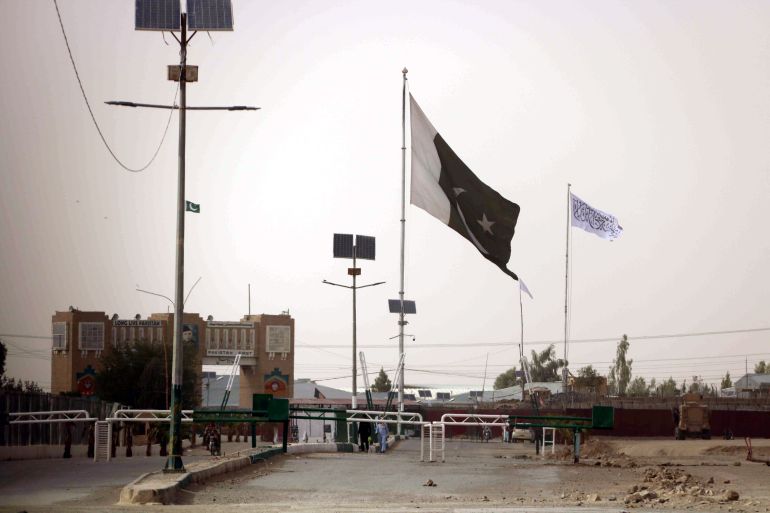#SanctionPakistan trends as violence rages in Afghanistan
Twitter hashtag shows the antipathy many Afghans hold for perceived role of their neighbour in the continuing war.

As violence from a Taliban offensive on government-held areas surges in Afghanistan, the use of the Twitter hashtag #SanctionPakistan by thousands has shown the antipathy many Afghans hold for the perceived role of the country’s eastern neighbour.
As of Wednesday, the hashtag had been used more than 730,000 times, with at least 37 percent of those tweets tagged as originating in Afghanistan, according to data from the social media insight company, Talkwalker.
Keep reading
list of 4 itemsAfghanistan’s leaders must ‘fight for themselves, nation’: Biden
‘Both sides just fire away without looking’: Afghan IDPs in Kabul
US envoy in Qatar to press Taliban for end to offensive
One of the main proponents of the trend has been journalist Habib Khan Totakhil, a former Wall Street Journal reporter, who has helped amplify voices using the hashtag.
“If you are Afghan or a friend of Afghanistan, speak up,” he tweeted on Monday, when #SanctionPakistan first began gaining widespread use.
“Use whatever platform you have to support the Afghan call for ending the proxy war. Afghanistan is under attack and needs you the most now. #SanctionPakistan”.
If you are Afghan or a friend of Afghanistan, speak up. Use whatever platform you have to support the Afghan call for ending the proxy war. Afghanistan is under attack and needs you the most now.#SanctionPakistan
— Habib Khan (@HabibKhanT) August 9, 2021
Relations between Pakistan and Afghanistan have been increasingly tense in recent months, with senior officials, including Afghan President Ashraf Ghani, accusing Pakistan of actively supporting the Taliban offensive that has seen the group seize control of at least nine district capitals since foreign troops began a final withdrawal.
Pakistan denies supporting the armed group, with its foreign ministry saying it supports “an Afghan-led and Afghan-owned” peace process, one that has stalled in recent months.
On Wednesday, Pakistani Information Minister Fawad Chaudhry hit out at critics of his country, saying the fault lay with the Afghan military for being unable to hold ground.
“With 8th province falling to Taliban, people of Afghanistan and people of USA must question so-called leadership of Afghanistan [as to] where 2 Trillion USD vanished that they received to build Afghan National Army?” he said.
With 8th province falling to Taliban,People of Afghanistan and people of USA must Question So called leadership of Afghanistan where 2 Trillion USD vanished that they received to build Afghan National Army? How come all ministers and generals became billionaires but
— Ch Fawad Hussain (@fawadchaudhry) August 11, 2021
“How come all ministers and generals became billionaires but people of Afghanistan are suffering due to poverty? Who is responsible for these sufferings? Corruption of Leadership drowns the nations and Afghanistan is an example of that.”
A day earlier, the Islamabad Policy Research Institute, a Pakistani government think-tank, released research alleging that the hashtag #SanctionPakistan “was artificially pushed on 9th and 10th August by mostly Indian and Afghan-sponsored accounts”, although it did not say how an account was deemed to be “sponsored”.
Widespread use
Nevertheless, the hashtag has continued to gain widespread use among Afghans, including journalists and rights activists.
“Pakistani state [has] chosen less than 100k Taliban militants over 35 million Afghan population – today in every Afghan home [Pakistan] has an enemy, is this worth it?” tweeted Wazhma Frogh, an Afghan rights activist.
“Why can’t Pakistani state choose to stand by Afghan nation instead? Millions of them, who have a lot in common with Pakistanis.”
Pakistani state chosen less than 100k Taliban militants over 35 million Afghan population-today in every Afghan home Pak has an enemy, is this worth it?
Why can’t Pakistani state choose to stand by Afghan nation instead? Millions of them,who have a lot in common with Pakistanis https://t.co/9qkZAfjYSU— Madam Frogh (@FroghWazhma) August 9, 2021
Daud Junbish, a prominent journalist, accused Pakistan of “supporting and directing terrorism”.
“The existence of Pakistan depends on supporting and directing terrorism. Unless and until this issue is dealt with, the world will never be safe for anyone. #SanctionPakistan,” he tweeted.
The existence of Pakistan depends on supporting and directing terrorism. Unless and until this issue is dealt with, the world will never be safe for anyone.#SanctionPakistan
— Daud Junbish (@DaudJunbish) August 11, 2021
Others used the hashtag to share messages of solidarity with Afghan government forces currently battling the Afghan Taliban.
“Guardians of our land and dignity! #SanctionPakistan,” said Samim Arif, an adviser to Afghan President Ghani, sharing an image of an Afghan soldier carrying a civilian to safety.
Guardians of our land and dignity!#SanctionPakistan pic.twitter.com/UMuOC7moRF
— Samim Arif (@SamimArif) August 10, 2021
Edris Lutfi, a former adviser to the Afghan government, dissented from what appeared to be the majority view, arguing that it was the Afghan leadership who should be sanctioned.
“If you want to unite people? Give them a) a common leader ([President] Ghani failed due to his ethno-fascist agenda) or b) a common enemy (Pakistan) which Ghani is going after,” he tweeted.
“However, the whole world played a part in bringing Afghanistan here but most importantly it was the corruption and ethnic agenda of the political elite, sanction them first.”
However, the whole world played a part in bringing Afghanistan here but most importantly it was the corruption and ethnic agenda of the political elite, sanction them first.
— Edris Lutfi – ادريس لطفى (@EdrisLutfi) August 9, 2021